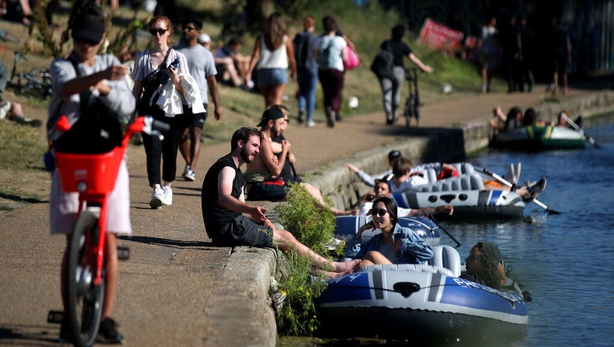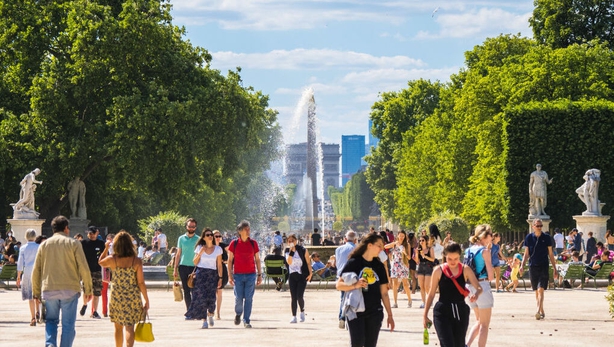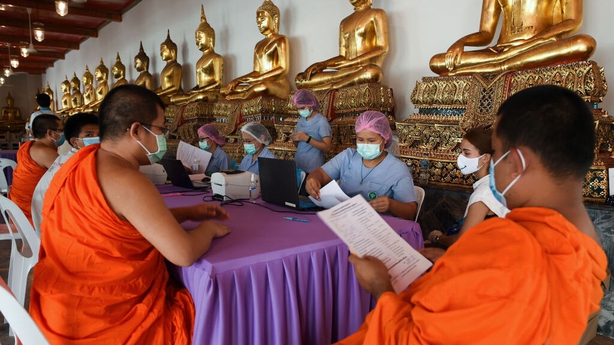Spain has recorded no coronavirus deaths over the past 24 hours for the first time since the beginning of March, a senior health ministry spokesman said.
"Today we have received no deaths with the date of death from yesterday," Fernando Simon, head of the Coordination Centre for Health Alerts and Emergencies told journalists.
The number of new cases had also fallen, he added.
Spain has recorded new deaths every day since 3 March, though the first death there from the virus in fact dates back to 13 February.
It is one of the countries worst hit by the pandemic, having recorded 27,127 deaths from 239,638 cases notified, according to the latest ministry figures.
Spain had become very fast at detecting cases, Mr Simon said.
However he warned against any failure to respect the existing restrictions on mass gatherings, still in force despite a gradual relaxation of what was one of the world's strictest lockdowns.
WHO praises 'immense' US contribution to global health
The head of the World Health Organization has praised the United States'"immense" and "generous" contribution to global health in a push to salvage relations after President Donald Trump said he was severing ties with the UN agency.
Mr Trump has accused the body of pandering to China and overlooking a ninitially secretive response to the Covid-19 outbreak.
On Friday he announced he was ending Washington's relationship with the WHO.
However WHO chief Tedros Adhanom Ghebreyesus told an online media briefing he hoped his organisation could continue its long-standing collaboration with the United States.
"The United States' contribution and generosity towards global health over many decades has been immense, and it has made a great difference in public health all around the world," he said.
China has reacted furiously to Mr Trump's move, calling it selfish and petulant politics by a US administration "addicted" to quitting international bodies and treaties.
Mr Tedros, who is Ethiopian, said he only knew about the US decision from the media, with no formal communication yet from Mr Trump's government.
He declined to answer further questions about the US stance.

Covid-19 cases above 1m in Latin America
Confirmed coronavirus cases in Latin America have surged past one million, while hard-hit Britain and Russia eased lockdowns, despite not having their outbreaks fully under control.
Governments around the world are moving to ease restrictions that have wrecked their economies, even as the number of cases tops 6.1 million and virus deaths exceed 371,000.
With more than half a million known infections, Brazil now has the second-highest caseload in the world, but its anti-lockdown President Jair Bolsonaro again defied social distancing recommendations yesterday.
Wearing no face mask, the far-right leader met a tightly packed group of supporters in the capital Brasilia as the crowd chanted "Myth! Myth! Myth!" - echoing his dismissal of the virus threat.
Mr Bolsonaro has been a staunch opponent of lockdowns as a tool for containing the coronavirus, saying they are unnecessary and harmful to the economy, but he has faced intense criticism from worried state authorities and angry citizens.
Despite his scepticism, the virus rages on in Brazil and other parts of South America, with the situation in Chile, Bolivia and Peru also worsening.
While South America and parts of Africa and Asia have only just started to feel the full force of the pandemic, hard-hit European countries have cautiously begun easing lockdowns as they seek a return to some form of normality.
But experts have cautioned that moving too fast could spell disaster, with no vaccine or effective treatment yet for Covid-19.
Top Italian doctor's claim virus 'no longer exists' sparks row
A claim by a leading Italian doctor that the new coronavirus "no longer exists" in the country has sparked a furore, with the government urging caution.
Italy is preparing this week for the next big step in easing a national lockdown imposed three months ago.
From Wednesday, foreign tourists will be able to enter again and people will be able to move between regions.
However the government has insisted this is one of the most dangerous phases of a pandemic that has claimed 33,500 lives in the country.
It has urged people to abide by social distancing rules and wear masks to prevent the virus from spreading once again.
"In reality, the virus clinically no longer exists in Italy," said Alberto Zangrillo, head of the San Raffaele Hospital in Milan, the capital of the northern Lombardy region, which has been the worst-hit by the pandemic.
"The swabs performed over the past ten days have showed a viral load that is absolutely infinitesimal in quantitative terms compared to those carried out a month or two months ago," he said in an interview on RAI television yesterday.
"Someone has to take responsibility for terrorising the country".
That prompted cries of disbelief from other experts and a warning from the government that it was too early to celebrate.
"Pending scientific evidence to support the thesis that the virus has disappeared, I would invite those who say they are sure of it not to confuse Italians," health ministry undersecretary Sandra Zampa said in a statement.
National Health Council head Franco Locatelli said he was "baffled" by Dr Zangrillo's comments.
"It's enough to look at the number of new positive cases confirmed every day to see the persistent circulation in Italy of the new coronavirus," he said.
The director of the prestigious Spallazani infectious diseases institute in Rome, Giuseppe Ippolito, said there was no scientific proof the virus had mutated or changed in potency.

Relaxation of restrictions continue worldwide
In England, where schools were set to partially re-open today, some senior government advisers warned things were happening too rapidly.
"COVID-19 spreading too fast to lift lockdown in England," tweeted Jeremy Farrar, a member of the government's Scientific Advisory Group for Emergencies.
Scotland, Wales and Northern Ireland have imposed different time frames for the easing of their restrictions.
Hard-hit Russia, which saw an explosion of infections in recent weeks, was also set to re-open shopping malls and parks in Moscow, despite the still-high number of cases.
While Muscovites welcomed the opportunity after weeks of being cooped up at home, many ridiculed Moscow Mayor Sergei Sobyanin's "experiment" aimed at regulating people's walks and exercise based on their home address.
The pandemic has devastated the global economy, which is facing its worst downturn since the Great Depression, and with businesses and citizens growing tired of confinement, there is pressure on many leaders to press on with reopenings - especially in nations where outbreaks appear to be slowing.
In the United States - the worst-affected nation in the world - Washington and Los Angeles resumed outdoor dining, while New York City is on track to begin re-opening from 8 June.
In France, parks in Paris opened on the weekend for the first time in months, ahead of restaurants, cafes and bars being allowed to serve on footpaths and terraces tomorrow.

But health experts have continued to warn of the possibility of a second wave of infections if authorities and citizens let their guard down, especially if they risk large gatherings of people like concerts, festivals and religious services.
With the outbreak in Italy slowing, Pope Francis made his first address to the faithful in St Peter's square in nearly three months.
In Saudi Arabia, mask-clad worshippers thronged mosques that opened nationwide - except in the holy city of Mecca.
Asia was the first continent hit by the virus after it emerged in the central Chinese city of Wuhan late last year, and neighbouring countries saw their economies hammered by the outbreak - especially the aviation and tourism sectors.
Some Asian countries have started on a tentative path to recovery, such as Thailand, which relies heavily on tourist spending.
The kingdom has now re-opened beaches nationwide after two months of lockdown to try to revive tourism.

But other, much more populous nations have moved to relax restrictions despite not entirely containing the disease.
India announced it would begin easing the world's biggest lockdown, even as it marked another record daily rise in infections.
Neighbouring Bangladesh, meanwhile, lifted its lockdown yesterday, with millions heading back to work in densely populated cities, even as the country logged record spikes in new deaths and infections.
